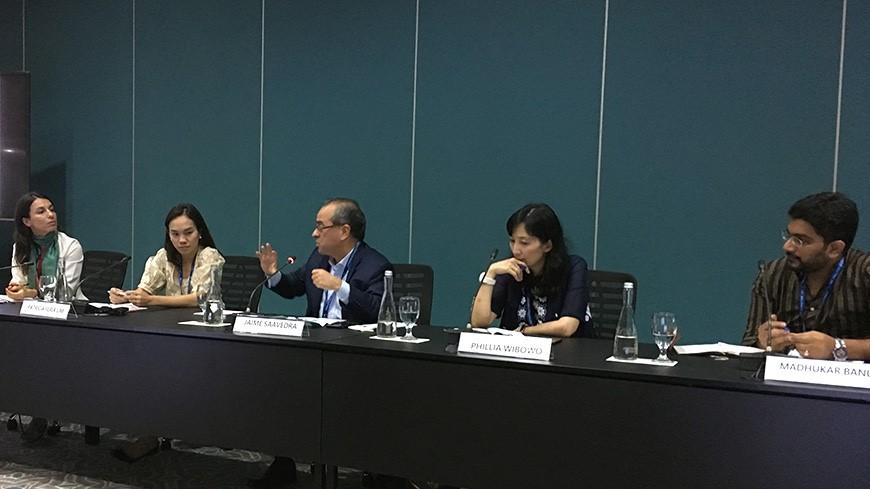Teach For All Encourages Greater Investment in Education Leadership at the IMF/World Bank Group Annual Meetings in Bali

On October 12, during the the International Monetary Fund and World Bank Group Annual Meetings’ Civil Society Policy Forum in Bali, Indonesia, Teach For All hosted a panel entitled “Investing in Human Capital to Make Progress Towards SDG 4.” Before an audience of international policymakers and civil society organizations, the panel underscored why investing in leadership development in education is critical to bolstering the human capital necessary to achieving the 2030 Sustainable Development Goals agenda.
The panel was moderated by Anna Molero, Teach For All’s Chief Government Officer, and included Jaime Saavedra, Senior Director and Head of the Education Global Practice at the World Bank Group; Phillia Wibowo, Managing Partner, McKinsey & Company’s Indonesia office; Madhukar Banuri, Founder and CEO of the non-profit Leadership for Equity and a Teach For India alumnus; and Patricia Feria Lim, Chief Strategy Officer for Teach for the Philippines.
Saavedra began the discussion by highlighting that the World Bank’s Human Capital Index is about outcomes. “We need to have the right policies, capacity development systems, and processes in place to fill the gap (in education and healthcare),” he explained and noted that the World Bank will also soon launch a Global Education Policy Dashboard that will give a snapshot of each country’s progress towards Sustainable Development Goal 4 (SDG 4), to “ensure inclusive and equitable quality education and promote lifelong learning opportunities for all.”
A key theme of this year’s IMF/World Bank Annual Meetings was how technology has become a disruptive force that could potentially have a negative impact, if the next generation is not adequately prepared to adapt to a fast-changing world.
Wibowo noted that automation and artificial intelligence (AI) are already taking over menial tasks in numerous industries, and countered that countries like Indonesia “will need strong leadership and management capacity in the education system” to keep up with the demand for creatives, engineers, computer programmers, teachers, and other roles that require critical thinking and innovation.
Madhukar Banuri and Patricia Feria-Lim have taken this theory of change and concretized it in their respective communities and organizations.
Banuri said his experience as a Teach For India Fellow working with parents, school leaders, and schools “pushed me to think about the complex systems in a smaller government school.” Today, Leadership For Equity works to create an ecosystem of support for teachers, school leaders, and government officials. The challenge, explained Banuri, is building motivation and accountability for improved education outcomes.
The recognition that supporting an education system should go beyond the classroom is what pushed Teach for the Philippines to pilot an innovative Ambassador Program that places its alumni in local government and national agencies, including the Department of Education. As a result of their experiences teaching in under-resourced schools and communities, “Alumni have the empathy and nuanced understanding on the ground, which helps them make informed and relevant policy changes in their respective agencies,” said Feria-Lim. She quoted the feedback of one local government officer who said that the “Ambassadors Program has revitalized the programs for youth and education in the city because it has brought this new energy and fresh ideas that the bureaucracy badly needed.”
In her closing remarks, Anna Molero thanked the speakers for bringing education to the forefront of the forum. “Learning is at the core of preparing our youth to meet the changing demands of our economies,” she said, and stressed that being able to measure how the world is investing in the next generation is critical to reaching the Sustainable Development Goals by 2030.



